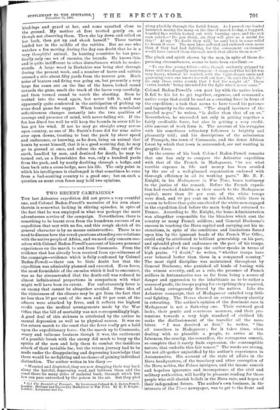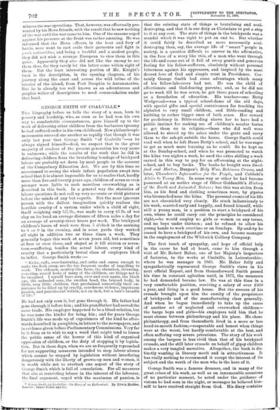TWO RECENT CAMPAIGNS.* Tirn last Ashantee expedition did not prove
a very eventful one, and Colonel Baden-Powell's narrative of his own share therein is somewhat lacking in stirring episodes, in spite of the fact that he was employed in what was perhaps the most adventurous service of the campaign. Nevertheless, there is something to be learnt even from the humdrum success of an expedition that met with no foe, and this rough sketch of its general character is by no means uninstructive. There is no need to discuss here the vexed questions attending our relations with the native people of Africa, and we need only concern our- selves with Colonel Baden-Powelra account of his own personal experiences on the march to and from Coomassie. From the evidence that has already been received from eye-witnesses of the campaign—evidence which is fully confirmed by Colonel Baden-Powell— there can be little doubt but that the expedition was admirably planned and executed. Even fever, the most formidable of the enemies which it had to encounter, was so far circumvented that the death-roll was reduced to almost infinitesimal proportions in comparison with what might well have been its extent. For unfortunately fever is an enemy that cannot be altogether avoided. Some idea of the viciousness of the climate may be got from the fact that no less than 50 per cent. of the men and 80 per cent. of the officers were attacked by fever, and it reflects the highest credit upon the medical arrangements made by the War Office that the bill of mortality was not correspondingly higb.
A good deal of this sickness is attributed by the author to mental depression as well as to physical causes. It was on the return march to the coast that the fever really got a hold upon the expeditionary force. On the march up to Coomassie, weary and toilsome business though it was, the excitement of a possible brush with the enemy did much to buoy up the spirits of the men and help them to combat the insidious attack of their invisible foe ; but the return journey had to be made under the disappointing and depressing knowledge that there would be no fighting and no chance of gaining individual distinction. The author writes in his diary :-
"Wearied and dispirited, they are now dragging their way back along the hateful, depressing road, and between them and the coast there lie many miles of malarial bush, through which but few can pass untouched by the poison in the air. But they plod • (1.1 The Downfall of Prempeh. By Lieutenant-Colonel E. S. Baden-Powell. London : Methuen and Co.—(2.) Madagascar in War Time. By E. P. Knight. London Longmans and Co. along pluckily through the foetid forest. As I passed one loaded hammock among the many on the line of march to-day, a haggard, bearded face within looked out with burning eyes, and the sick man asked,—' Do you think, sir, they will give us a medal for this ? ' At my No doubt they will,' he sank back in some relief to dream it over. The men have suffered and endured oven more than if they had had fighting, for the consequent excitement would have carried them through much that affects them now."
The pluck and spirit shown by the men, in spite of these de- pressing circumstances, seems to have been excellent :— " To one fine young fellow—who, though evidently gripped by fever still was doggedly marching on—I suggested that his kit was very heavy, whereat he replied, with the tight-drawn smile and quavering voice one knows too well out here, ' It ain't the kit, Sir ! its only these extra rounds that I feel the weight of.' These extra rounds' being intended for the fight which never came."
Colonel Baden-Powell's own post lay with the native levies. It fell to his lot to get together, organise, and command a native corps that could be used as a covering force in front of the expedition; a task that seems to have taxed his patience and ingenuity to the utmost. "The stupid inertness of the puzzled negro." he writes, "is duller than that of an ox." Nevertheless, he succeeded not only in getting together a
fairly creditable force, but also in getting a very credit. able amount of work from it. The account of his struggles with his sometimes refractory followers is brightly and pleasantly told ; and his descriptions of the submission
of Prempeh, the town of Coomassie, and the dense African forest by which that town is .surrounded, are not wanting in graphic force.
In the course of his book Colonel Baden-Powell remarks that one has only to compare the Ashantee expedition with that of the French in Madagascar, " to see what terrible expense in life and money has been avoided by the use of a well-planned organisation endowed with thorough efficiency in all its working parts." Mr. E. F. Knight, in his Madagascar in War Time, bears testimony
to the justice of the remark. Before the French expedi- tion had reached Andriba on their march to the Madagascar capital, more than 10 per cent, of the white troops were dead, and 60 per cent on the sick-list, while there is reason to believe that quite one-third of the white men engaged in the expedition died before the main body had returned to France. According to Mr. Knight, the home Administration was altogether responsible for the blunders which cost the country so many French soldiers; and General Duchesne's success in reaching the Hova capital and carrying out his in-
structions, in spite of the conditions and limitations forced upon him by the ignorant heads of the French War Office, could only be attributed to brilliant generalship on his part,
and splendid pluck and endurance on the part of his troops.
Of the conduct of the troops the author speaks in terms of high praise. "I doubt," he writes, "whether troops have ever behaved better than these in a conquered country." The most rigid discipline was maintained throughout by General Duchesne, who punished all kinds of looting with the utmost severity, and, as a rale, the presence of French soldiers in Antananarivo was so far from being a source of danger and oppression to the inhabitants as to be rather a source of profit, the troops paying for everything they required, and being outrageously fleeced by the natives. Like the Ashantee campaign, that of Madagascar entailed very little real fighting. The Hovas showed an extraordinary alacrity in retreating. The author's opinion of the dominant race in Madagascar is not a flattering one. Their outward good
looks, their gentle and courteous manners, and their pre-
tensions towards a very high standard of civilised life make the disillusionment of the traveller all the more bitter. " I was deceived at first," he writes, " like all travellers in Madagascar ; for it takes time, when dealing with so plausible a people, to arrive at the falseness, the cruelty, the cowardice, the outrageous conceit, so complete that it rarely finds expression, the contemptible nature, that underlie this fair veneer." The words are strong, but not altogether unjustified by the author's experiences in Antananarivo. His account of the state of affairs in the Hova headquarters, of the treachery and utter corruption of the Hova nobles, the Palace intrigues, and the insane conceit and hopeless ignorance and incompetence of the civil and military authorities, will hardly be pleasant reading for those people who still cherish beliefs in the Hova race, and hopes of
their independent future. The author's own business, in the interests of the Times newspaper, was to get to the front and
witness the war operations. That, however, was effectually pre- vented by his Hova friends, with the result that he saw nothing of the war until the war came to him. One of the reasons urged against his presence at the front was rather amusing. He was informed that the Hova officers, in the beat and fury of battle, were wont to cast aside their garments and fight in purls naturalibus, and being a bashful and a modest people, they did not wish a strange European to view them in this guise. Apparently they also did not like the enemy to see them thus, for they rarely let the latter come within sight of them. Not the least interesting portion of Mr. Knight's book is the description, in the opening chapters, of his journey along the coast and across the wild tribes of the interior of the island, from Fort Dauphin to Antananarivo. But he is already too well known as an adventurous and graphic writer of descriptions to need commendation under that head.























































 Previous page
Previous page